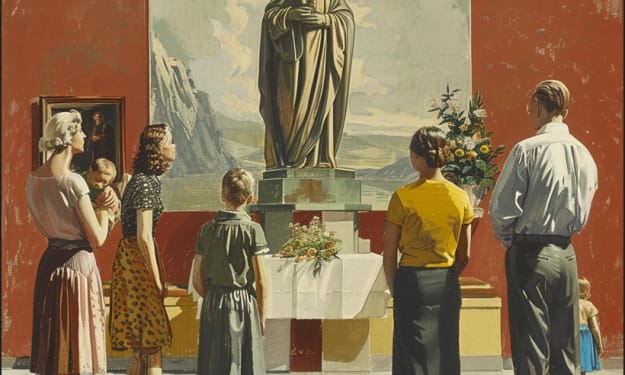MOMMOM FOREVER
How To Look After Your Grandma During This Pandemic

During times like these, it’s important to keep an eye out for the most vulnerable among us, and in the case of the coronavirus pandemic, that means older adults who are at a higher risk of developing serious complications from COVID-19.
Whether they’re our grandparents, friends, or neighbors, we all probably have an older adult in our lives who could use a little help right now. Here are 8 ways to step up for them during the pandemic.
1. Minimize your risk.
Keeping your loved ones safe starts with keeping yourself safe. Remember that the virus can spread even while a person shows no symptoms of infection, so the best way to prevent risk to your older loved ones is to avoid physical contact with them if possible. For those who live with or care for an older adult under one roof, it’s important to practice as much physical distancing as possible, maintain safe home hygiene, and consider wearing a face mask when sharing space.
2. Reach out.
The coronavirus is forcing a lot of at-risk folks to shelter at home, and while it’s the safest choice, it’s not always the easiest. Even without the current crisis, more than 50% of older Americans report feeling lonely, and social isolation can lead to some serious negative health outcomes.
Related: Thoughtful Gifts For MomMoms and Grandparents During This Pandemic
Being physically distant doesn’t mean we have to be socially distant! Reach out to your older neighbors, friends, and family to check in on them and help them combat social isolation. Even a regularly scheduled phone call is enough to show someone you care.
3. Help run errands.
For those most vulnerable to the coronavirus, going out in public presents a different level of risk, and physical distancing guidelines for older folks suggest they should try to avoid it if possible.
Your older loved ones still need food, medicine, and other basic supplies, so if you’re at a lower level of risk, try to help out where you can. Offer to go grocery shopping for them, pick up their medication at the pharmacy, or any other essential expedition out into the world that they can’t do themselves.
4. Teach them how to use tech.
In a world with limited physical contact, the next best thing is a virtual connection. Chances are your grandparents may not be all that tech-savvy, but it’s never too late for them to learn!
Maybe don’t throw grandma into something like Zoom or Snapchat right away (though filtered grandparent selfies could be pretty cute). Start small and work your way up -- texting, sending pictures, Facetiming, etc. Here are some tips for doing it!
5. Write letters.
If the tech lessons aren’t working out, you can always go for a more old-school approach (and if we’re having a public health crisis like it’s 1918, might as well bring this back too). Experts agree that the risk of acquiring the coronavirus through mail is highly unlikely, so feel free to send off a few letters to your loved ones.
Bonus: writing letters can also give you a nice change of pace if you’re feeling that self-isolation boredom, and it’ll get you away from your screens for a while. Become pen pals with an older loved one, and maybe one day your quarantine letters will be kept as a testament to this strange moment in history.
6. Drop off a care package.
You know those feelings you’re having, like boredom, stress, or restlessness? The older folks in your life are probably feeling a lot of those same things. Beyond the essentials, think about the things they’d like to have to make the time go by a little easier, and drop off a few in a care package.
You could include magazines, treats, crafting supplies, cozy socks, family photos, personal care products, or really anything else that would make them smile. Here are 150+ care package item ideas to inspire you.
7. Keep them informed.
With so much information out there both online and off, it’s easy for anyone to get overwhelmed, and older adults may find it especially hard to get accurate and factual news. Help your loved ones stay informed by looping them in to the timely stuff they need to know, from sources that can be trusted.
Stay updated through the World Health Organization (WHO), Centers for Disease Control and Prevention (CDC), and your local health department. Pass along any new information or guidance to the older adults in your life to keep them in the know, and help them find answers to the things they’re not sure of.
8. Volunteer.
This one is two-fold. For one thing, older adults (55-75) give more hours of volunteer service each year than any other generation, to the tune of 2.2 billion hours. With more of these folks staying at home, that can leave a lot of organizations that depend on volunteer support in a bind. If your older loved ones regularly volunteer somewhere, see if you can help fill in the gaps in their absence.
Plus, you can help a lot of at-risk adults directly through volunteering. By helping out at a senior center, meal distribution program, or local mutual aid group, you have the ability to make a real impact in the lives of folks struggling during the pandemic. If you need a place to start, try contacting your local food bank or senior center.
Read more about our precious mommoms
About the Creator
Dandelionclub
Writer, Hobbyist, Traveller, Art Lover





Comments
There are no comments for this story
Be the first to respond and start the conversation.